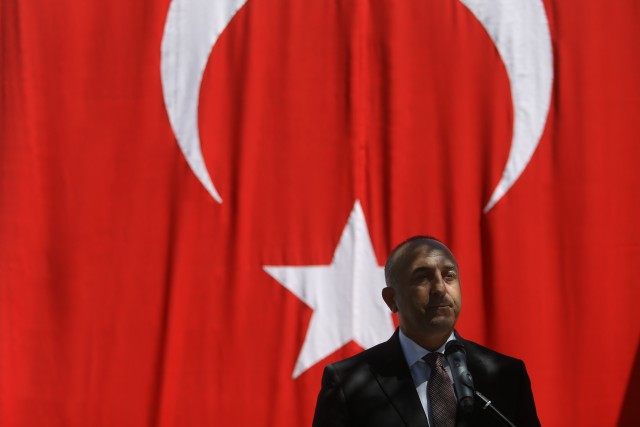BRUSSELS (AP) — For just the fifth time in its 66-year history, NATO ambassadors will meet in emergency session Tuesday to gauge the threat the Islamic State extremist group poses to Turkey, and the debated actions Turkish authorities are taking in response.
The extraordinary meeting at NATO headquarters was requested by Turkey under Article 4 of the treaty that founded the U.S.-led alliance, which empowers its 28 member states to seek such consultations when they consider their “territorial integrity, political independence or security” to be in jeopardy.
It comes as Turkey’s security situation “has deteriorated dramatically,” Bruno Lete, senior officer for foreign and security policy at the German Marshall Fund, a Brussels think tank, said.
“The rise of Islamic State in northern Iraq, in northern Syria, has effectively destabilized the southern border of Turkey. But also domestically, the threat of terrorism has become very real,” Lete told The Associated Press.
NATO Secretary-General Jens Stoltenberg, who will chair the closed-door session, said Turkey requested it following recent “heinous terrorist attacks,” which included an IS suicide bombing near Turkey’s border with Syria that left 32 people dead and an IS attack on Turkish forces, which killed a soldier.
“NATO allies follow developments very closely and stand in solidarity with Turkey,” Stoltenberg said in announcing Tuesday’s meeting of the alliance’s main political decision-making body, the North Atlantic Council.
According to official NATO records, there have been only four other so-called Article 4 meetings since the U.S.-led alliance was created in 1949.
Most recently, NATO ambassadors convened in March 2014 at Poland’s request following Russia’s annexation of Crimea from Ukraine.
After months of reluctance, Turkish warplanes last week started striking militant targets in Syria and entered a long-awaited agreement which allows the U.S. to launch its own strikes from Turkey’s strategically located Incirlik Air Base.
The United States and Turkey on Monday were also finalizing plans for a military campaign to push the Islamic State group out of a strip of Syrian territory along the Turkish border.
But in a series of cross-border strikes since Friday, Turkey has not only targeted the IS group but also Kurdish fighters affiliated with forces battling IS in Syria and Iraq.
The Syrian Kurds are among the most effective ground forces battling the IS group and have been aided by U.S.-led airstrikes, but Turkey fears they could revive an insurgency against it in pursuit of an independent state.
The Kurdistan Workers’ Party, or PKK, has fought Turkey for autonomy for Kurds in a conflict that has claimed tens of thousands of lives since 1984. The Kurds are an ethnic group with their own language living in a region spanning present-day Turkey, Iraq, Syria, Iran and Armenia.
For some NATO members and independent observers, it’s still not clear whether Turkey’s No. 1 target is IS or the Kurds, said Ian Kearns, director of the European Leadership Network, a London-based think tank.
What’s more, Turkish leaders “have actually been arguing that the Kurds in Syria are more of a threat to Turkey,” Kearns told the AP. He said the targets chosen in the recent military strikes by Turkey were clear confirmation of that geopolitical calculus.
On Monday, Syria’s main Kurdish militia and an activist group said Turkish troops shelled a Syrian village near the border, targeting Kurdish fighters.
The official NATO announcement of Tuesday’s meeting of alliance ambassadors said one of the reasons Turkey sought it was to explain “the measures it is taking.” Turkish Foreign Minister Mevlut Cavusoglu told reporters Monday he would spell out in detail the security threats his country faces.
“We expect solidarity and support from our NATO allies,” he said, without elaborating.
Cavusoglu, who spoke during an official visit to Lisbon, Portugal, flatly refused to draw a distinction between IS and PKK.
“There is no difference between PKK and Daesh. You can’t say that PKK is better because it is fighting Daesh,” Cavusoglu said, using an Arabic acronym to refer to the Islamic State group.
___
Bassem Mroue in Beirut and Barry Hatton in Lisbon contributed.

COMMENTS
Please let us know if you're having issues with commenting.